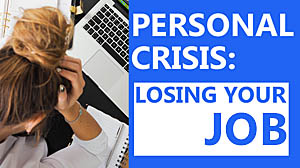


Personal Crisis: You Lose Your Job. A Media Training Technique Can Help You Get a New Gig
by Howard Fencl, Hennes Communications
Let’s step away from talking about crises your company may face and talk about a personal crisis that millions of us face – the threat of job loss. With the COVID pandemic, job loss went viral. More than 20 million Americans lost their jobs to COVID in March and April alone.
Most of us don’t have any control over the situation – but we DO control how we talk about ourselves in a job interview.
I’ve media trained thousands of people and written extensively about prepping for news interviews. When people in my family started losing their jobs this year, I had a revelation – the control tool I teach in media training could help them prep for a job interview. And it could help you, too.
Click here to see a short video on this subject.
It’s the same principle: don’t walk into a media interview and wing it, and don’t try that on a job interview either. If you don’t prepare and all you do is answer questions, you have no control over the flow of the interview. Every question is a surprise. And your interviewer probably won’t reach the conclusion you want – that you’re the right person for the job.
Here’s how you help them see it your way: Arrive at a job interview armed with short, memorable messages about yourself. Think about it this way – if there was one thing, and one thing only you want your interviewer to remember about you, what would that one thing be? What’s a second thing? What’s a third? Write them down and practice them out loud.
Don’t have more than three or four messages about yourself. Let’s face it, job interviews are nerve-wracking, and you probably won’t remember more than three or four messages in the heat of the moment anyway. And your interviewer won’t remember a barrage of messages.
Drop all your messages right from the get-go of your interview: “It’s great meeting you. The three things I’d immediately bring to the table for ABC Corporation are…” and share all your messages. Repeat them throughout the interview and reiterate them at the end: “So if you remember nothing else about me, I hope you’ll remember…” and again, drop your messages.
Saying them early and often throughout the interview increases the likelihood that your interviewer will remember you. It also gives you some control over the flow of the interview – it’s very likely that follow-up questions will be based on what the interviewer just heard you say. Your messages set context.
Once you have your priority messages down, write a list of the toughest questions you think you’ll be asked. What about the gap in your employment on your resume? Were you ever fired from a job? Why were you fired? Tell me about a time you failed on the job and what you learned from it. What’s your biggest weakness? Write answers for all of them – include language from your key messages in your answers whenever you can.
Now hand that list over to someone you trust and conduct a mock interview – on video. Practice your answers. Practice using messages. Watch the video and figure out how you can do it better. Then do it better. Do it enough so that when the time comes for your actual interview, it’s muscle memory. You’ll project more confidence. Your answers will be memorable. And you’ll have done a better job at getting a job.
—–
Photo by energepic.com from Pexels